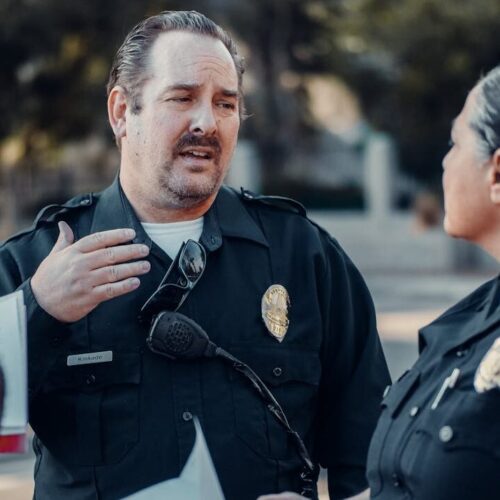
Site Snapshot: How Five Jurisdictions Are Rethinking Crisis Response with the 988 Suicide and Crisis Lifeline
Six months after the Substance Abuse and Mental Health Services Administration (SAMHSA) transitioned to a national 988 dialing code for the Suicide and Crisis Lifeline, call takers have directly connected hundreds of thousands of people to trained crisis responders within the National Suicide Prevention Lifeline Network. For law enforcement and other criminal justice leaders, the transition has also presented an opportunity to work with their partners in behavioral health to rethink how people are connected to compassionate, accessible care and redesign crisis responses that, when implemented effectively, minimize contact with law enforcement and the justice system.
This snapshot is the first in a series of web articles focused on law enforcement’s role in planning for and implementing 988, highlighting five jurisdictions that are starting this important work.
Fairfax County, Virginia
According to SAMHSA, comprehensive crisis systems have three core components: someone to call in a behavioral health emergency, a response team available for crisis intervention, and somewhere to go for evaluation, stabilization, and follow up. In Fairfax County, Virginia, experts from local behavioral health and public safety agencies have been meeting in bi-weekly “synergy sessions” since early 2022 to advance the work of public safety agencies and the regional crisis call center, with the goal of serving community members in crisis. With the national transition to 988, these team members also began using the sessions to discuss 988 implementation and opportunities for enhanced collaboration and educate each other on internal 911 and 988 processes. Team members also used real-life call scenarios to develop shared processes for warm handoffs between 911 and 988 staff, and the county began a coordinated effort to educate the public about the 988 dialing code through county agencies and leaders, presentations to community meetings, social media, and local media outlets.
Six months into the transition, Fairfax County now uses the local regional crisis call center to receive all 988 calls, texts, and chats. Callers to the regional center are provided with phone support and are referred to local resources, as needed, and planning is underway to allow the center to dispatch mobile crisis teams by summer 2023. All these efforts are being implemented as part of a statewide effort to develop a comprehensive crisis system.
The State of Colorado
Prior to the national transition to 988, the Colorado Department of Public Safety convened a statewide workgroup, including state agencies and local public safety answering points (PSAPs), to support an integrated dispatch and crisis services response to behavioral health-related 911 calls. Since then, state officials have worked together and with local leaders to tackle one of Colorado’s key challenges: establishing ways to link its 911 dispatch centers with the Colorado Crisis and Support Services Line, which also operates as Colorado’s 988 call center. The workgroup has partnered with the Colorado 911 Resource Center, Rocky Mountain Crisis Partners, local PSAPs including in Denver and Englewood, and community treatment providers such as the San Luis Valley Behavioral Health Group and others to develop a statewide approach that redirects individuals with behavioral health needs away from the justice system and to points of care.
To fund this work, Colorado is leveraging federal grant dollars through the Justice and Mental Health Collaboration Program. The state also plans to use the funding for several related goals including:
- Creating an interactive web-based planning and decision-making tool for region-specific specialized responses;
- Developing a program registry and interactive map for specialized responses, which include programs such as co-response teams, diversion programs, or mobile crisis teams;
- Providing virtual, on-demand training opportunities for emergency communication specialists regarding behavioral health competency and the importance of wellness for dispatchers; and
- Designating state police-mental health collaboration peer learning sites, modeled after the national Law Enforcement-Mental Health Learning Site
Los Angeles County, California
Even prior to the national transition to 988, the Los Angeles Police Department has been at the forefront of nationwide efforts to improve law enforcement’s responses to people in crisis, developing specialty response teams such as the Case Assessment and Management Program (CAMP), the Systemwide Mental Assessment Response Team (SMART), and notably serving as a member of the Law Enforcement-Mental Health Learning Site program. Because of these and other efforts, Los Angeles County Department of Mental Health (DMH) officials already had a working collaboration with law enforcement to address the needs of people in crisis.
Since 988, these efforts have improved to offer people more options for being connected to services without law enforcement intervention. Now, once a 988 call is routed in Los Angeles County, a trained crisis counselor is available to answer the phone, provide support, and share resources. If a field response is needed, a mental health team will be dispatched by the DMH. Teams are currently comprised of behavioral health professionals from the DMH’s psychiatric mobile response teams or the newly contracted mobile crisis outreach teams.
The county has promoted the new 988 dialing code through social media, news articles, press releases, and a Frequently Asked Questions factsheet, including guidance around when to call 911 vs. 988. The Los Angeles Police Department’s Mental Evaluation Unit also shares 988 information and resources with law enforcement officers during their Mental Health Intervention Training so that they are equipped with accurate information to help educate and empower the communities they serve.
Los Angeles County is also in the process of identifying key performance indicators for its crisis response system, including data such as the number of calls resolved over the phone, calls requiring field response, and time taken to dispatch a field response. This process has leaned on the effective collaborations that officials have continued to cultivate with DMH partners, Didi Hirsch Mental Health Services, the Los Angeles Police Department, and other law enforcement agencies who participated in the development and launch of 988 efforts.
Johnson County, Kansas
The Johnson County Mental Health Center (JCMHC) has had a 24/7 local crisis line for more than 30 years. In that time, the center has become an important resource for law enforcement officers to receive real-time assistance while de-escalating situations and assessing safety as someone may be experiencing a behavioral health crisis. The collaboration between JCMHC and law enforcement has helped the county provide the right level of intervention for people in crisis and even divert some individuals from being arrested, with about 20 percent of the calls to JCMHC’s crisis line stemming from law enforcement.
The transition to 988 in Johnson County builds on JCMHC’s existing collaboration with law enforcement. Since JCMHC’s local crisis line became a dedicated 988 call center, leaders have committed to building a crisis team that will be solely responsible for responding to 988 calls. When the 988 crisis team is fully staffed and trained, they will be embedded within Johnson County’s 911 dispatch center, and staff from both JCMHC and 911 dispatch will share technology. Dispatch protocols will also be developed and implemented to divert appropriate behavioral health-related 911 calls to the 988 crisis team.
Marin County, California
Multiple county, city, and community-based organizations have been working together to ensure a seamless transition to 988 in Marin County. Early on, teams from Buckelew Programs, Inc.—a local community-based nonprofit with years of experience providing suicide prevention lifeline services—County Behavioral Health, and law enforcement met regularly to develop protocols for determining risk, triaging callers to the appropriate level of care, and ensuring clear communication among providers.
Now, the county’s 988 call center is overseen by Buckelew with trained crisis counselors available 24/7. If a situation requires an in-person response, 988 crisis counselors contact the county-operated Mobile Crisis Response Team (MCRT). MCRT clinicians can meet individuals in person, evaluate risk, and offer services, including psychiatric hospitalization if needed. If a situation requires a public safety response, 988 crisis counselors contact the local 911 dispatch centers that can send police, fire, or emergency medical response.
About the authors


In response to growing calls for police reform in New Jersey, particularly following the shootings of Najee Seabrooks…
Read MoreThe sharp rise in school shootings over the past 25 years has led school officials across the U.S.…
Read More Three Things to Know About New Jersey’s Groundbreaking Community Response Legislation
Three Things to Know About New Jersey’s Groundbreaking Community Response Legislation
In response to growing calls for police reform in New Jersey, particularly following the shootings of Najee Seabrooks and Andrew Washington in March and August 2023, a coalition of law enforcement officials, mental health professionals, and community advocates partnered to explore public safety response alternatives.
Read More Taking the HEAT Out of Campus Crises: A Proactive Approach to College Safety
Taking the HEAT Out of Campus Crises: A Proactive Approach to College Safety
The sharp rise in school shootings over the past 25 years has led school officials across the U.S. to take a closer look at ways to keep students safe. For Chaffey College in Rancho Cucamonga, California, a tragic incident at a nearby university hit close to home and spurred campus leaders to revisit their own school’s threat assessments and crisis responses.
Read More From 911 to 988: Salt Lake City’s Innovative Dispatch Diversion Program Gives More Crisis Options
From 911 to 988: Salt Lake City’s Innovative Dispatch Diversion Program Gives More Crisis Options
A three-digit crisis line, 988, launched two years ago to supplement—not necessarily replace—911. Calling 988 simplifies access to services when people are seeking help for themselves or loved ones with suicidal thoughts, behavioral health concerns, or substance use-related crises.
Read More Matching Care to Need: 5 Facts on How to Improve Behavioral Health Crisis Response
Matching Care to Need: 5 Facts on How to Improve Behavioral Health Crisis Response
It would hardly be controversial to expect an ambulance to arrive if someone called 911 for a physical health emergency. And yet, for years, the default responders for a behavioral health emergency have been law enforcement officers, not behavioral health professionals.
Read More











